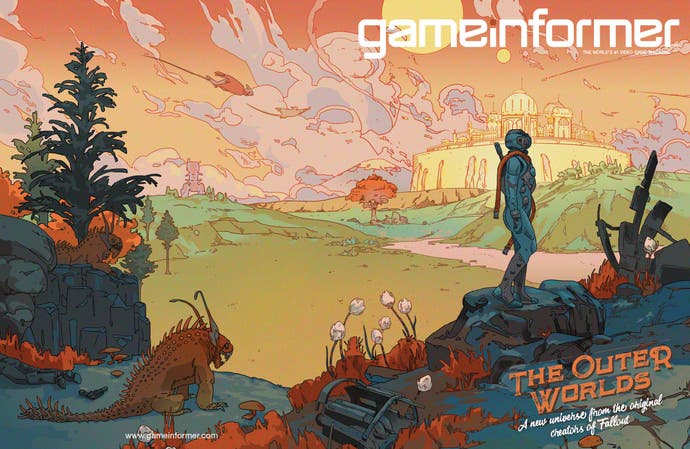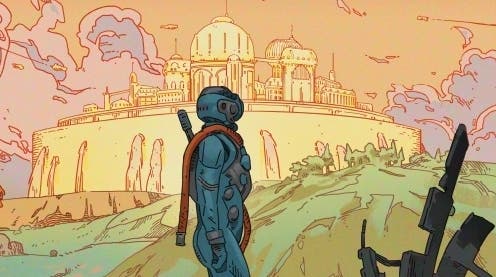Visiting post-acquisition Obsidian to see how much has changed
"After your 47th Mai Tai..."
I visited Obsidian Entertainment a couple of weeks ago for the reveal of the studio's first game for new owner Microsoft. If you remember, The Outer Worlds was published by Private Division, Take-Two's label for partnering with independent studios (Obsidian was independent when the deal was made). This was, then, a significant moment.
The game itself was a bit of an anti-climax - Grounded, a small-team survival game with a Honey I Shrunk the Kids hook - but I still got an opportunity to nose around the studio and see what changed post-acquisition and since I visited in August 2017.
The answer, in a nutshell, is "not a lot", which is encouraging. Obsidian still resides in the same office block in the eerily perfect city of Irvine, California, and still occupies the same amount of office space. It's still a bit tatty, which I like, and the only real sign there's now Microsoft money behind the studio is a pile of boxes with computers and monitors in them.
"I'm not the CEO any more" -Feargus Urquhart
Where the PR and community team used to live is where the Grounded team now lives, in a corner of the office in a small room roughly the size of a living room. I mention this because it helps paint a picture of how small the Grounded operation is.
To picture the rest of Obsidian, imagine a square and in each corner you have a different team. There are lots of hallways and rooms - it's not open-planned - but in each corner there's an open area where the occupants of nearby rooms teams can convene.
One of these corners is devoted to The Outer Worlds and shoved into another is Grounded. But the other two? Pillars of Eternity is no longer an active thing so what were all the other people working on? I spied my best, by the way, but didn't see anything incriminating - unsurprising for an organised press tour. But on my way around I did see people like Tim Cain waving from his office (Outer Worlds co-director) and, I'm pleased to say, Josh Sawyer. I'm pleased because I genuinely thought he was going to leave.
Sawyer sounded fed up when he talked at Digital Dragons earlier this year. He said Pillars of Eternity 2: Deadire had been "the most stressful directing experience I've had so far" and that he was "burnt out" directing and making isometric RPGs. He also talked about being overridden a number of times by management during development, which sounded ominous.
But Sawyer is there at Obsidian, beloved bike in his office, headphones on, tapping away at something - as far as I know he's finished making the pen-and-paper Pillars of Eternity role-playing game.
In a separate interview, Sawyer's Pillars pal Adam Brennecke, who's directing Grounded, told me: "Just like with Outer Worlds we have big RPGs being worked on right now. We have a lot of stuff being worked on right now." So I thought I'd ask Feargus Urquhart "how many?" at the end of his guided office walkaround tour.
"More than one, less than forty," he told me with a smile. "We're working on a number."
The Outer Worlds is included in that. A post-release plan hasn't been announced yet but there's still a team in The Outer Worlds corner working on something. Obsidian isn't leaving it behind in a rush to work on Microsoft projects.
"Actually it's the opposite," Urquhart said. "What's always been interesting about the independent developer before was: who was going to pay for support? If I'm not being paid for support by the publisher then [...] we have this weird thing of how do we do it?
"In the Microsoft world, we get to run a studio based on what makes sense for the franchises and I'm not having to make these day-to-day decisions so much. People are obviously loving Outer Worlds and we made it because we love it, so now we get to keep on doing things to help support [it]."
It makes sense - not least because Obsidian, and presumably now Microsoft, owns The Outer Worlds IP. Tim Cain mentioned this in an interview with Game Informer a while back, saying, "we get to retain ownership of the IP". Supporting it works out well for everybody, and who knows? One day The Outer Worlds 2 might be an important next-Xbox game.
My tour of Obsidian was strikingly similar to the last time Feargus Urquhart led me (and Chris Bratt) around the studio. I filmed that walkaround and there's this brilliant bit where I film the carpet - it's not to be missed. But the difference this time is Urquhart is no longer Obsidian CEO.
"So I got demoted," he joked (he was as jocular as ever). "No, so, Obsidian is still a separate company and I am no longer an owner so I can't be on the board, in theory. I'm not the CEO any more.
"All of us are studio heads, whether that's Guillaume [Provost - Compulsion Games] or Brian [Fargo - Inxile Entertainment] or Rod Fergusson [The Coalition] - we're all just called studio heads."
Otherwise, structurally, nothing seems to have changed. "More structurally? No," Uruqhart said. More or less the same number of people work at Obsidian now - 185 people - and there are no plans to go above 200. "Assassin's Creed is awesome and all those big games are awesome," he told Kat Bailey from USG, who stood with me, "but maybe I'm old school [because] I don't think we need to compete with numbers. If that means more focused games: awesome. I don't want to do 1000-person games."
I've wanted to speak to Urquhart since the Microsoft acquisition but for one reason or another I haven't been able or allowed to. Part of that, I'm sure, has to do with my wanting to put the allegations made by former Obsidian design director Chris Avellone to him.
Avellone accused Obsidian management of, among other things, meddling in projects and causing more harm than good, usually resulting in more work for the team. When Microsoft was rumoured to be buying Obsidian, Avellone even went so far as to Tweet Xbox boss Phil Spencer to say, "Hire the devs, fire the chaff at the top." Avellone elaborated on his frustrations with Obsidian management in an interview with VG247 earlier this year.
I still haven't had the chance to really sit down with Urquhart to put Avellone's allegations to him, and all the questions I asked him on this visit were off the cuff, made while we were walking around. It wasn't the time or place. But I did unearth some related information.
Microsoft didn't, for instance, "fire the chaff at the top". The co-owners, "they're all still around", Urquhart told me. No one has taken the money and run. Chris Parker, for instance - director of Alpha Protocol - is now making a new game, presumably in charge of it.

"I want to make role-playing games," Urquhart went on, "my partners want to make role-playing games, so this is the best place to do that. We all laugh [about] going to sit on a beach in Fiji but that would be entertaining for about a month. After your 47th Mai Tai...
"I and my partners - and everybody - got in this to make games. That's what's interesting to me. The thing with Microsoft changes that equation and that's cool."
By changing the equation, he means he no longer has to relentlessly pitch Obsidian to publishers to keep the lights on. "Increasingly my job over the last five years has been business, more and more and more," he said. "But more of my job now gets to actually be working on games."
In what capacity? "Meddling," he told USG, with what had to be a knowing grin. "I would love to be a game director again," he said. "I got to do that back on Fallout 2, I've done it intermittently for short periods of time here, and it would be cool to be a game director again."
Whether or not that will be a good thing, we'll have to wait and see, but at the moment, the signs are encouraging for Obsidian. You're only as good as your last game, they say, and for Obsidian it was very recently The Outer Worlds, which has gone down well and is exceeding Take-Two/Private Division's expectations.
Gone is the anxious volatility of independence, replaced by a safety net of Microsoft ownership and support, plus a burgeoning family of Microsoft Studios to lean on. Adam Brennecke had just been visiting some of them - Rare (Sea of Thieves) and Playground Games (Forza Horizon). "Not only at Obsidian are there multiple teams," he said, "but multiple teams across the world we'll be able to communicate with and share ideas and bounce things off of."
Yet, there will be things lost as the transition matures - invisible things which are harder to quantify. Maybe the office will lose the air of informality it once enjoyed; maybe the freedom to work and create will be encroached upon by mandated procedures and company policies; maybe more people in suits will hang around the office (I saw people in suits this time I don't remember from before). Maybe lots of little things will add up to a big change. And then, as a wise friend once told me, all the muscle in the world won't help if the heart has left the body.
But we're not there yet.
Flights and accommodation for this trip were paid for by Microsoft.



